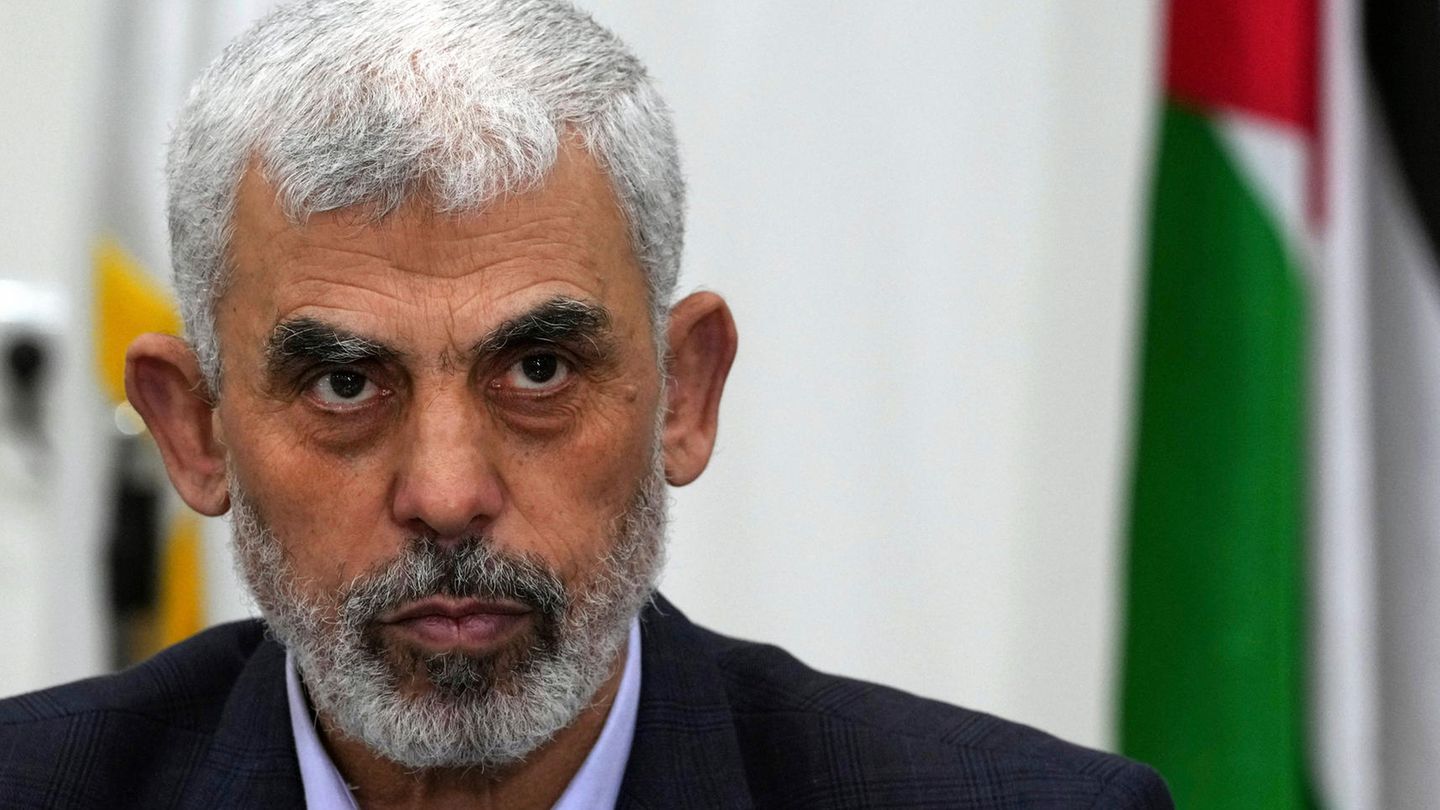Jihia al-Sinwar is the Hamas underground mastermind and coordinated the October massacre in Israel. He is feared even in Gaza because of his propensity for violence.
He is considered the mastermind of the unprecedented attack in southern Israel on October 7: Less than a week after the killing of Hamas foreign chief Ismail Haniya, the Islamist terror group has appointed the Hamas leader in the Gaza Strip, Jihia al-Sinwar, as the new leader of the organization. Hamas announced this on the Telegram platform. He is now the head of the Hamas political office, it said.
Israeli Foreign Minister Israel Katz called Sinwar an “arch-terrorist.” His appointment was “another compelling reason to quickly remove him and wipe this vile organization from the face of the earth,” Katz wrote on Platform X.
Sinwar is at the top of Israel’s hit list. He lives in an unknown location in the Gaza Strip – it is suspected that he is hiding in the organization’s tunnels under the sealed-off coastal area. He has not made any public appearances since October 7. His predecessor Haniya resided in Qatar’s capital Doha and was considered Hamas’s chief diplomat.
Haniya was killed last week in an Iranian government guesthouse in Tehran, where he was staying for the inauguration of the new Iranian President Massoud Peseschkian. Iran and Hamas blame Israel for the attack and are threatening retaliation.
Is there a threat of a boycott of the war negotiations?
With the election of a man who Israel considers to be public enemy number one as the new Hamas leader, efforts to reach a ceasefire and release the hostages in exchange for Palestinian prisoners from Israeli jails are likely to become even more difficult.
Initial reactions from Palestinians in the Gaza Strip were mixed. “This means the death of the political process and peace talks,” said a resident of Beit Hanun in the north of the Gaza Strip. “I don’t know how Hamas dared to elect the biggest extremist in the movement.” A Palestinian in the southern Khan Yunis, however, saw Sinwar’s rise as a “logical result” after Israel had rejected all proposals for a negotiated solution.
Al-Sinwar has always been associated with Hamas
Sinwar spent more than two decades in Israeli custody, during which time he learned to speak fluent Hebrew. He was released in 2011 in exchange for the release of an Israeli soldier and was already a member of Hamas’ political office in the Gaza Strip in April 2012, where he became its leader in internal elections in 2017. Since then, the militant Hamas wing has also grown considerably in strength.
In May, the chief prosecutor of the International Criminal Court in The Hague requested an arrest warrant for Sinwar, Haniya and Sinwar’s deputy Mohammed Deif. He accused the Hamas leaders of crimes against humanity, including “extermination” as well as murder, hostage-taking, rape and torture.
Sinwar belongs to the founding generation of Hamas. He was born in 1962 in the refugee camp of Khan Yunis in the south of the Gaza Strip. His family comes from the area around the coastal city of Ashkelon, which is now on Israeli territory.
“The Butcher of Chan Junis”
Sinwar’s former deputy Deif, the commander of the Al-Qassam Brigades and thus the military wing of Hamas, was the target of an Israeli rocket attack in July. Israel declared him dead last week. Haniya, in turn, was killed last week in an assassination attempt in the Iranian capital Tehran.
When Hamas was formed in the fight against the Israeli occupation during the first Palestinian uprising, the Intifada, in the late 1980s, Sinwar was also involved in setting up Hamas’ military wing, the Qassam Brigades. In the early years of the Islamist movement, Sinwar was responsible for fighting suspected collaborators with Israel within its own ranks. He acted so brutally that he became known as the “Butcher of Khan Yunis.”
Fear of counterattack grows
The Israeli military is currently on high alert. The country is expecting a retaliatory strike from Iran and its allies in the region, including the Shiite Hezbollah militia in Lebanon. Tehran had announced “harsh punishment” for Israel after the attack on Haniya.
Threatening escalation
Who is on whose side in the Middle East?
Israel can count on the support of the United States and other allies in intercepting rockets, cruise missiles and drones from Iran and its proxy groups with modern defense systems.
In the terrorist attack by Hamas and other extremist groups in southern Israel on October 7, 2023, around 1,200 people were killed and 250 others were abducted to the Gaza Strip. Since then, Israel has been waging war against Hamas in the Gaza Strip. However, countless Palestinian civilians have also fallen victim to the fighting. Israel is therefore being criticized worldwide.
Source: Stern
I have been working in the news industry for over 6 years, first as a reporter and now as an editor. I have covered politics extensively, and my work has appeared in major newspapers and online news outlets around the world. In addition to my writing, I also contribute regularly to 24 Hours World.




